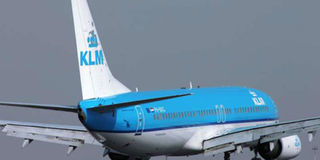Ban insecticides on airplanes, this is a discriminatory practice

I would be foolish to divorce the spraying of aircraft cabins in Africa from the devastatingly destructive myths about our continent. PHOTO | FILE | NATION MEDIA GROUP
What you need to know:
- Saudi Arabia, like Kenya, has malaria. New York, like many American cities, has roaches and bugs – and some of them can transmit salmonella and typhoid.
- But I have never seen an aircraft sprayed with insecticides prior to departure from an American city to any country abroad.
- If the concern is killing disease-carrying bugs, why not fumigate the luggage of passengers leaving the United States to make sure they don’t donate the roaches to the countries of their destination?
Kenya’s transport CS James Macharia is asleep at the switch. His boss, Uhuru Kenyatta, needs to lasso him and bring him back to his senses. I am very angry at the practice of certain carriers – such as Saudia and KLM – spraying insecticides in their planes before takeoff from JKIA. The practice, known as disinsection, isn’t done when the same airlines leave JFK in New York or Heathrow, London.
VIOLENT AND PRIMITIVE
Nor do they spray the chemicals when leaving Amsterdam Schiphol Airport or Jeddah for Nairobi. Kenya Airways doesn’t reciprocate and douse its cabins with any carcinogens when leaving Schiphol or Jeddah. Question – why does Kenya and Mr Macharia allow such discriminatory and potentially cancer-causing practice?
The West has propagated the worst white supremacist myths and stereotypes about Africa. Let’s sample a few. Africa is a country. Africa is the heart of darkness – the Dark Continent. Africans are dumb, stupid, and lazy. Africans are child-like. Africa is one huge hot desert. Africa is the hottest place on earth. Africa is the origin of the worst pestilences. Africa is disease-ridden. Africa is mired in irredeemable poverty. Africans need to be saved, often from themselves. Africans are violent, primitive, and worse than animals. Africans have no sovereignty of reason. Without the white man, Africa would still be living in the dark ages. Africans, no better than monkeys, live in “shithole” countries. The list stretches to Casablanca.
It’s not uncommon for a European or American child to ask an African if Africans live in trees, or whether Africa has cars or roads. In the white mind, Africa is benighted. It’s King Kong. Everything of African origin – black skin, African hair, the African nose – are images of revulsion. That’s how white American and European popular culture – also depicted by Hollywood – stigmatises blackness. Too bad they have ready accomplices in Kenyan celebrities and media socialites. This ugly image of Africa has been sold to cultures outside the West. In Asia and Latin America, where white people aren’t even the majority, negative stereotypes of Africa are common. The West has done a number on us.
CANCER-CAUSING
I would be foolish to divorce the spraying of aircraft cabins in Africa from the devastatingly destructive myths about our continent. I have travelled millions – literally millions – of miles in airplanes. I’ve been to virtually every country on earth. That’s why I can speak with authority about the practices of cabin crews of major airlines. I’ve asked cabin crew why they spray cabins out of African or certain developing countries. I often get blank stares, non-responsive responses, but sometimes they say it’s to eliminate the risk of vector-borne diseases by killing mosquitoes, ticks, and other bugs. One member of the crew told me she didn’t want to transport the little nasty creatures back to her country where they’d incubate and multiply.
Typically, as the crew sprays the cabin, a voice comes over the public address system to tell helpless passengers, and I am quoting, “We are spraying the cabin with an insecticide that’s not harmful or dangerous.” The World Health Organization (WHO) and the International Civil Aviation Association authorise disinsection but passengers aren’t told why they are spraying, what the insecticide is, or why it’s not harmful or dangerous. I thought that the point of insecticides is that they ARE harmful and dangerous – that’s why they kill the little bugs. The same with pesticides and herbicides. Roundup, for example, is a deadly cancer-causing herbicide produced by Monsanto. They are toxic and carcinogenic.
FORCIBLY CONSUME
Monsanto and the vendors of Roundup have been heavily sanctioned by American courts for either failing to disclose the risks of the herbicide or for false advertising. In one case in San Francisco, a jury awarded $289 million to a plaintiff whose cancer was traced back to the herbicide. There have been many other damages awarded by courts. My point is that the use of insecticides, herbicides, and pesticides, especially in enclosed spaces like airplane cabins where passengers will inhale – forcibly consume – the fullest dose, is a serious public health matter. Who determines which airports are dangerous enough for their planes to be fumigated with killer substances? How safe are the insecticides? Why are passengers sitting ducks left in the dark?
Saudi Arabia, like Kenya, has malaria. New York, like many American cities, has roaches and bugs – and some of them can transmit salmonella and typhoid. But I have never seen an aircraft sprayed with insecticides prior to departure from an American city to any country abroad. If the concern is killing disease-carrying bugs, why not fumigate the luggage of passengers leaving the United States to make sure they don’t donate the roaches to the countries of their destination? It’s unfathomable Africa is the only continent with deadly disease-carrying bugs. We need transparency and an irrefutable explanation why Kenya permits the practice. It should be banned or at a minimum done when passengers aren’t on board.
Makau Mutua is SUNY Distinguished Professor at SUNY Buffalo Law School and Chair of KHRC. @makaumutua





